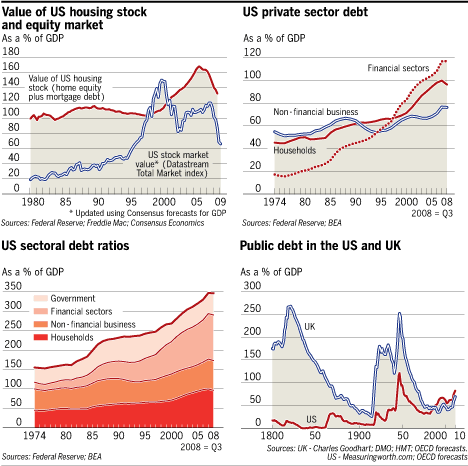From the Financial Times:
The point of the FT article was to describe how it is extremely difficult for the private sector to deleverage, or reduce debt levels, during periods of falling prices…As the charts show, the US is witnessing debt balloon to levels not seen since the 1950’s (as a percentage of GDP), while asset prices have fallen precipitously.
As the author describes;
It has long been argued that the US could not suffer like Japan. This is wrong. It is true the US has three advantages over Japan: the destruction of wealth in the collapse of the Japanese bubble was three times gross domestic product, while US losses will surely be far smaller; US non-financial companies do not appear grossly overindebted; and, despite efforts by opponents of marking assets to market, recognition of losses has come far sooner.
Basically, our situation is more similar to that of Japan circa 1990-2005 than we had anticipated – not to mention some economic characteristics which are considerably less desirable (a global recession, leaving little room for other countries to pick up the slack in our budget/trading deficit by buying our debt and consuming our exports).
Surprisingly, part of the reason the author included all of this background was to advocate for a bigger stimulus package, not to be depressing.
Unfortunately, there is no discernible solution to the problems brought up in this article, other than the old “we’ll have to tough this one out” analysis:
The bigger point, however, is not that the package needs to be larger, although it does. It is that escaping from huge and prolonged deficits will be very hard. As long as the private sector seeks to reduce its debt and the current account is in structural deficit, the US must run big fiscal deficits if it is to sustain full employment.
There will be a Part II to this author’s column in next week’s FT, if at all interested.



